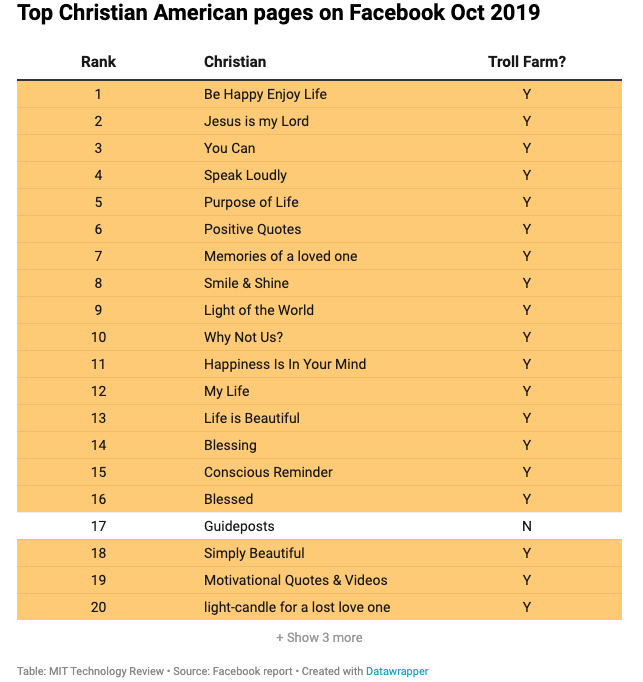Top Christian Facebook Pages Are Actually Troll Farms [Content Made Simple]
Issue #239: We're all just content, incentives for publishing wither, and more.
Troll farms reached 140 million Americans a month on Facebook before 2020 election, internal report shows
Quote:
In the run-up to the 2020 election, the most highly contested in US history, Facebook’s most popular pages for Christian and Black American content were being run by Eastern European troll farms. These pages were part of a larger network that collectively reached nearly half of all Americans, according to an internal company report, and achieved that reach not through user choice but primarily as a result of Facebook’s own platform design and engagement-hungry algorithm.
Commentary:
Man I love the MIT Technology Review. This is a great bit of journalism and research. You really hate to see this reality, though, don’t you? Eastern European troll farms target Christians and other groups of users on the most popular social media platform in the world. Internet media literacy is a huge problem. We need to learn how to be Christians on the internet and it is a lot more than just “being nice to people online” (while of course that is important, too).
HITTING THE LINKS
Link #1: No More Apologies: Inside Facebook’s Push to Defend Its Image
Look, I really don’t like going hard in the paint on Facebook almost every single time I send this newsletter, but this is some seriously messed up stuff. Facebook is using the most valuable real estate on the internet to talk about how great they are in an effort to play defense against their deteriorating public image. That is…not cool.
Mark Zuckerberg, Facebook’s chief executive, signed off last month on a new initiative code-named Project Amplify.
The effort, which was hatched at an internal meeting in January, had a specific purpose: to use Facebook’s News Feed, the site’s most important digital real estate, to show people positive stories about the social network.
The idea was that pushing pro-Facebook news items — some of them written by the company — would improve its image in the eyes of its users, three people with knowledge of the effort said. But the move was sensitive because Facebook had not previously positioned the News Feed as a place where it burnished its own reputation. Several executives at the meeting were shocked by the proposal, one attendee said.
Link #2: To the algorithm, we're all just content
I love Ryan Broderick’s newsletter. I’m not subscribed to the paid version because I can only handle so many subscriptions, but I love the free pieces he provides. I was going to write on the Gabby Petito situation until I read this from Ryan on Monday and saw that he said everything I was thinking and more.
“The way true crime turns real people’s trauma into entertainment for profit is already disgusting. But watching it unfold in real time with Gabby Petito’s case is nauseating,” Richards tweeted. “TikTok’s algorithm means any video can go viral and thus any video that ‘might help solve the case’ can go viral.”
That last point by Richards is really important I think. This is “signal boost” culture turned up to eleven, with every random idea that could be “useful” being accelerated by TikTok’s users, and, in turn, the app’s incredibly powerful recommendation system. Which has given the whole case a deeply uncomfortable gamification. As The Guardian’s Moira Donegan tweeted, “Everyone knows this already but it’s very jarring to see the way a woman’s murder in a likely domestic violence situation is morphed into entertainment in real time.”
Link #3: The Incentives to Publish No Longer Reward the Web’s Creators
Shoutout to my friend Trevin for sending this along to me this week. I think this is interesting, but I’m still chewing on it a bit. No doubt I agree with the premise that the author has: web platforms are using their technologies to benefit business at the cost of creators. I also agree with his conclusion, that it’s best not to get too caught up in the platforms. Lots to think about here, for sure.
Conduct and publish amazing research on your own site. Crickets.
Publish it as a tweet thread, a native LinkedIn article, a big graphic of text on Facebook, a photo series on Instagram. Likes, shares, visibility, and the dopamine hit of social validation are yours.I’m exaggerating. But only slightly. Incentives govern behavior.
Algorithms that optimize for engagement train creators on how to behave, what to produce, and how to share it.
Content marketing has changed. Social media marketing has changed. SEO has changed.
They’ve changed because the platforms moved the goalposts, or rather, replaced how “goals” could be scored. It’s not just the crowding of creator opportunities, it’s the systems and incentives.
THE FUNNY PART
If you like this, you should subscribe to my free newsletter of funny content I find online. It’s called The Funnies. It delivers on Saturday mornings.
You can subscribe to The Funnies here. (It is and will always be free.)



